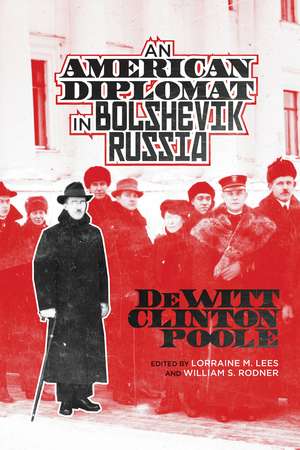An American Diplomat in Bolshevik Russia
Autor DeWitt Clinton Poole Editat de Lorraine M. Lees, William S. Rodneren Limba Engleză Paperback – 5 ian 2015
Diplomat DeWitt Clinton Poole arrived for a new job at the United States consulate office in Moscow in September 1917, just two months before the Bolshevik Revolution. In the final year of World War I, as Russians were withdrawing and Americans were joining the war, Poole found himself in the midst of political turmoil in Russia. U.S. relations with the newly declared Soviet Union rapidly deteriorated as civil war erupted and as Allied forces intervened in northern Russia and Siberia. Thirty-five years later, in the climate of the Cold War, Poole recounted his experiences as a witness to that era in a series of interviews.
Historians Lorraine M. Lees and William S. Rodner introduce and annotate Poole's recollections, which give a fresh, firsthand perspective on monumental events in world history and reveal the important impact DeWitt Clinton Poole (1885–1952) had on U.S.–Soviet relations. He was active in implementing U.S. policy, negotiating with the Bolshevik authorities, and supervising American intelligence operations that gathered information about conditions throughout Russia, especially monitoring anti-Bolshevik elements and areas of German influence. Departing Moscow in late 1918 via Petrograd, he was assigned to the port of Archangel, then occupied by Allied and American forces, and left Russia in June 1919.
Historians Lorraine M. Lees and William S. Rodner introduce and annotate Poole's recollections, which give a fresh, firsthand perspective on monumental events in world history and reveal the important impact DeWitt Clinton Poole (1885–1952) had on U.S.–Soviet relations. He was active in implementing U.S. policy, negotiating with the Bolshevik authorities, and supervising American intelligence operations that gathered information about conditions throughout Russia, especially monitoring anti-Bolshevik elements and areas of German influence. Departing Moscow in late 1918 via Petrograd, he was assigned to the port of Archangel, then occupied by Allied and American forces, and left Russia in June 1919.
Preț: 154.92 lei
Nou
Puncte Express: 232
Preț estimativ în valută:
29.64€ • 30.95$ • 24.48£
29.64€ • 30.95$ • 24.48£
Carte disponibilă
Livrare economică 25 martie-08 aprilie
Preluare comenzi: 021 569.72.76
Specificații
ISBN-13: 9780299302245
ISBN-10: 0299302245
Pagini: 356
Ilustrații: 6 b-w illus.
Dimensiuni: 152 x 229 x 48 mm
Greutate: 0.41 kg
Ediția:1
Editura: University of Wisconsin Press
Colecția University of Wisconsin Press
ISBN-10: 0299302245
Pagini: 356
Ilustrații: 6 b-w illus.
Dimensiuni: 152 x 229 x 48 mm
Greutate: 0.41 kg
Ediția:1
Editura: University of Wisconsin Press
Colecția University of Wisconsin Press
Recenzii
"One of the strong points of this engrossing book is that Poole is providing his view of the Russian Revolution at the time the events unfolded as well as from the perspective of the early 1950s, when he was interviewed about his experiences in Soviet Russia. The juxtaposition of these two perspectives is especially illuminating."—Bertrand Patenaude, Stanford University
"Sent to Moscow in 1917, junior diplomat DeWitt Clinton Poole witnessed and reported on crucial developments before and after the Bolshevik seizure of power. In addition to being a keen observer, Poole played important and little known roles in U.S. unofficial relations with the early Soviet government and contacts with anti-Bolshevik forces in the developing civil war in Russia. His oral history memoir helps to fill in the gaps in the published records of events."—David Foglesong, Rutgers University
“[This] new book chronicling the impressions of a US traveler who witnessed the Russian Revolution firsthand offers a fascinating insight into that momentous historical event. . . . Alongside geopolitical records are details of everyday life: Poole’s journey through a disintegrating Russia, with British novelist Somerset Maugham as a chance companion in a train with a piano in the dining car, is vividly recalled.”— Russia beyond the Headlines
“A fascinating edition of US diplomat DeWitt Clinton Poole’s oral account of his experience in revolutionary Russia from 1917 to 1919. . . . His views of the early Bolshevik government, like those of other Americans who were there, are critical as the centennial of the Russian Revolution approaches. Highly recommended, all levels/libraries.”—Choice
“A historical treasure trove for an era that will never be short on paradoxes, colorful characters, brutal conflict, and harrowing circumstances. Poole, one of the last American diplomats in Russia after the Bolshevik revolution and before recognition in 1933, was a cool, detached observer of events, and rather prescient in his predictions.”—Russian Life
“Poole’s memoirs remind us that, before November 1918 when the First World War ended and Kolchak staged his counter-revolutionary coup in Siberia, the Allies’ main concern was to keep Russia in the war. . . . The memoirs also shed important light on the political atmosphere in Moscow in July and August 1918 when not only Poole but the Left SRs as well were convinced that Soviet Russia had become little more than a colony of Imperial Germany. With such important insights into the origins of Allied intervention in Russia, these memoirs are an important addition to the documentary record of the Russian Civil War.”—Europe-Asia Studies
Notă biografică
DeWitt Clinton Poole Jr. (1885–1952) had a long government career that included work for the State Department and intelligence agencies. He also directed the School of Public and International Affairs at Princeton University, where he founded the journal Public Opinion Quarterly, and was a founder of the National Committee for a Free Europe. Lorraine M. Lees is a professor of history at Old Dominion University and the author of Keeping Tito Afloat: The United States, Yugoslavia, and the Cold War and Yugoslav-Americans and National Security during World War II. William S. Rodner is a professor of history at Tidewater Community College and the author of Edwardian London through Japanese Eyes: The Art and Writing of Yoshio Markino, 1897–1915.
Cuprins
List of Illustrations
Acknowledgments
Editors' Note
Introduction
1 Arrival: The American Embassy, 1917; the Bolshevik Takeover
2 Missions to South Russia: Moscow, Spring and Summer, 1918
3 Mirbach Assassination: The Czech Legions; Allied Intervention
4 The Red Terror: Escape from Moscow
5 Archangel, 1918–1919
6 Russia and the Paris Peace Conference
7 Return to Washington: Head of the Russian Division, Department of State, 1919–1920
Epilogue
Bibliography
Index
Acknowledgments
Editors' Note
Introduction
1 Arrival: The American Embassy, 1917; the Bolshevik Takeover
2 Missions to South Russia: Moscow, Spring and Summer, 1918
3 Mirbach Assassination: The Czech Legions; Allied Intervention
4 The Red Terror: Escape from Moscow
5 Archangel, 1918–1919
6 Russia and the Paris Peace Conference
7 Return to Washington: Head of the Russian Division, Department of State, 1919–1920
Epilogue
Bibliography
Index
Descriere
Almost one hundred years after World War I and the Russian Revolution, U.S. diplomat DeWitt Clinton Poole’s (1885–1952) perspective on his experiences negotiating with Bolshevik authorities and monitoring anti-Bolshevik movements throughout the Soviet Union is now fully accessible. Through Poole’s perspective, a key figure in U.S.–Soviet relations, this book sheds new light on the Russian Revolution and World War I.













